Home > About Us > Corporate Social Responsibility > Sustainability Report > Sustainability Report 2006 > Coexistence and Harmony with Society
| Environmental Management Sustainability Report 2006 |
|||
| Coexistence and Harmony with Society |
The Kobe Steel Group is committed to harmonious coexistence and cooperation with society. To that end, we contribute to local communities and promote international cooperation through participation in beneficial social activities both as a Group and through individual employees. |
| Contribution to Local Communities |
| Kobe Steel's operating locations contribute to the beautification of local landscapes by participating in clean-up campaigns and other activities. In addition, they contribute to communities by engaging in social service. In fiscal 2005, for example, we dispatched environmental lecturers to Amagasaki Technical High School in Hyogo Prefecture and Kobe Takatsuka High School in Kobe. |
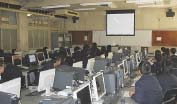 Environmental education at Amagasaki Technical High School |
| Environmental Activities in Local Communities |
|
||||||||||||||||
| Kobe Steel established the Kobelco Natural Environment Conservation Fund and the Kobelco Environment Creation Fund in April 2001 to support people involved in activities to conserve the natural environment. Kobe Steel will continue to support wide-ranging environmental conservation activities, through various undertakings that go beyond the framework of the Kobe Steel Group, while recognizing the importance activities at the popular level. |
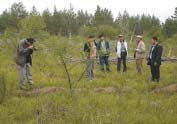 Tree planting in Mongolia 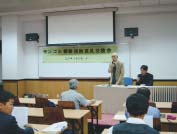 |
|
| Cooperation with the Local Community |
| Shinko Kobe Power Inc. in Kobe supplies heat from its power generation plants to three sake breweries in the Nishigo area_Nishigo is one of the five areas renown for sake brewing in Kobe and Nishinomiya. | 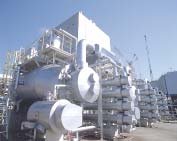 Steam generator |
| Greening of Operating Locations |
| To improve the quality of the surrounding environment and contribute to the absorption of CO2 in the air, Kobe Steel's operating locations are building green zones around their facilities and growing various kinds of foliage. For example, near the center of the grounds of the Kobe Corporate Research Laboratories, we completed construction of a biotope in the summer of 2005 to commemorate the centennial of Kobe Steel's founding. The many commemorative trees that had been planted throughout the grounds were transplanted to the periphery, and new trees were planted to create an environmentally friendly place in which to pursue research. |
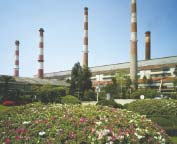 Greening of factory site 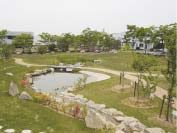 Biotope at Kobe Corporate Research Laboratories |
| International Cooperation |
| The Kobe Steel Group accepts trainees from abroad and provides technical training. Promoting international cooperation, Kobe Steel utilizes its broad experience in the environmental and energy fields. |
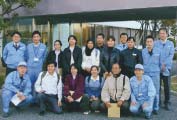 Overseas trainees at Kobelco Eco-Solutions Co., Ltd. |
|
| Aluminum Can Collection and Recycling |
As Japan's largest producer of rolled aluminum products, Kobe Steel launched the Shinko Aluminum Can Back program in 1990 at all divisions, offices and operating locations. This program continues in many forms today. For example, the Moka Plant and Shinko Moka Sohgo Service Ltd. are working with authorities in Tochigi Prefecture and other companies to mount a public relations campaign about recovering and recycling aluminum cans. To that end, they send a car-mounted can press to local summer festivals and other events to demonstrate how recycling is done. |


